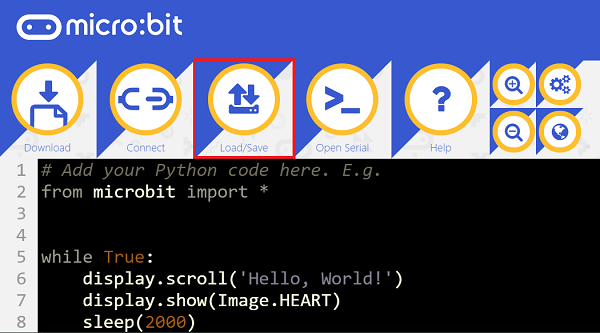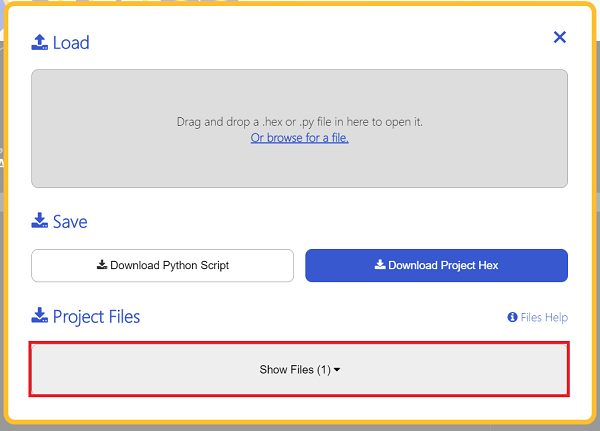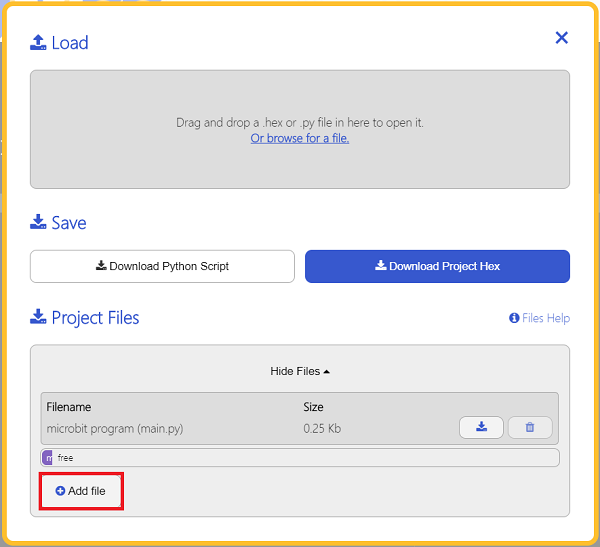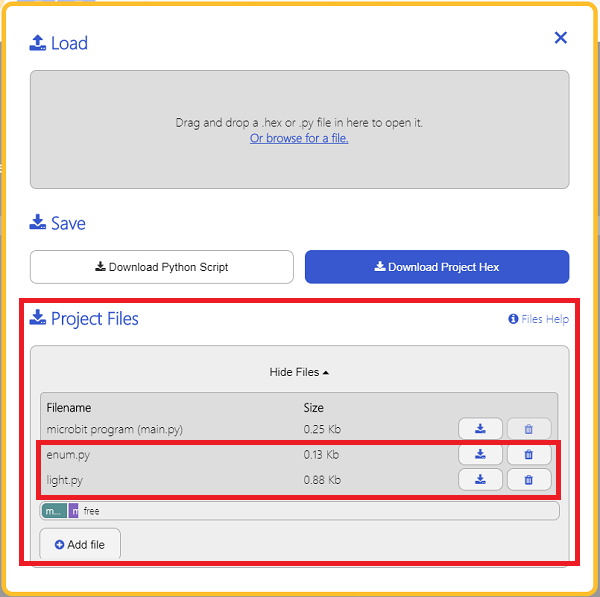AI-Lens-Python Samples Code
Contents
1.2. AI-Lens-Python Samples Code#
1.2.1. Add Python File#
We’ve created a codebase EF_Produce_MicroPython-master for a convenient python programming to AI Lens, you will only need to use the functions and modify the parameters for application.
Download the package and unzip it: EF_Produce_MicroPython-master
Go to Python editor

For programming, we need to add the file of AILens.py. Click Load/Save first and again with Show Files(1), choose “add file” to get to the download page to find the file folder of EF_Produce_MicroPython-master, then add AILens.py.



1.2.2. API#
| API | Description |
|---|---|
AILENS() |
Init AI Lens |
switch_function(func) |
Choose AI Lens functions,funcchoose function:(Learncharacteristics learn;Cardcard recognition;Faceface recognition;Trackingtracking recognition;Colorcolor recognition;Ballball recognition) |
get_card_content() |
Recognize the contents on the card |
get_card_data() |
Get the info of the cards from the AI Lens to a list(X-axis; Y-axis; Width; Height; Confidence coefficient; Total numbers of cards; ID of current cards) |
get_face() |
Judge if there is a human face recognized in the AI Lens |
get_face_data() |
Get the info of the face(s) from the AI Lens to a list(X-axis; Y-axis; Width; Height; Confidence coefficient; Total numbers of face(s); ID of current face(s)) |
get_ball_color() |
Recognize the color of the balls in the Ai Lens |
get_ball_data() |
Get the info of the ball(s) from the AI Lens to a list(X-axis; Y-axis; Width; Height; Confidence coefficient; Total numbers of ball(s); ID of current ball(s)). |
get_track_data() |
Get the info of the segment(s) from the AI Lens to a list(Deviation angel, deviation distance, segment length) |
get_color_type() |
Recognize the color of the cards in the AI Lens |
get_color_data() |
Get the info of the color(s) from the AI Lens to a list(X-axis; Y-axis; Width; Height; Confidence coefficient; Total numbers of color(s); ID of current color(s)). |
learn_object(learn_id) |
Name with an ID number for a learnt object, ID number: 1~5 |
get_learn_data() |
Get the info of the learnt object(s) from the AI Lens to a list(ID of the object(s); Confidence coefficient). |
class AILENS(object)
Init AI Lens
def switch_function(self, func)
Choose AI Lens functions, funcchoose function, Learncharacteristics learn, Cardcard recognition;Faceface recognition;Trackingtracking recognition;Colorcolor recognition;Ballball recognition)
def get_image(self)
Get an image
def get_ball_color(self):
Recognize the colors of the balls in the Ai Lens(If ball is blue, the returned result is ‘Blue’; if the ball is red, the result is ‘Red’; or it returned with a ‘No Ball’ )
def get_ball_data(self)
Return the info of the balls in the AI Lens,BallData [x,y,w,h,confidence,total,order]。
x:X-axis
y:Y-axis
w:width
h:height
confidence:Confidence coefficient
total:total numbers of the balls in the AI Lens
order:ID of the current ball
def get_face(self)
Judge if any face(s) in the Ai Lens
def get_face_data(self)
Return the info of human face in the AI lens, FaceData [x,y,w,h,confidence,total,order]。
x:X-axis
y:Y-axis
w:width
h:height
confidence:Confidence coefficient
total:total numbers of the face(s) in the AI Lens
order:ID ID of the current face
def get_card_content(self)
Return the contents on the cards, the possible value are:
numberCards = [”0”, “1”, “2”, “3”, “4”, “5”, “6”, “7”, “8”, “9”]
letterCards = [”A”, “B”, “C”, “D”, “E”]
otherCards = [”Mouse”, “micro:bit”, “Ruler”, “Cat”, “Peer”, “Ship”, “Apple”, “Car”, “Pan”, “Dog”, “Umbrella”, “Airplane”, “Clock”, “Grape”, “Cup”, “Turn left”, “Turn right”, “Forward”, “Stop”, “Back”]
If no cards get recognized, the returned value is ‘No Card’
def get_color_type(self)
Return the colors of the cards, the possible colors are:
Green card:”Green”
Blue card:”Blue”
Yellow card:”Yellow”
Black card: “Black”
Red card: “Red”
White card: “White”
If no colors get recognized, the returned value is ‘No Color’
def get_color_data(self)
Return the info of the color(s), ColorData [x,y,w,h,confidence,total,order]
x:X-axis
y:Y-axis
w:width
h:height
confidence:Confidence coefficient
total:total numbers of the color(s) in the AI Lens
order: ID of the current color
def get_track_data(self)
Return the info of the segment(s) LineData [angel,width,len]
angel:return the deviation angel of the segment in the AI Lens
width: return the deviation distance of the segment in the AI Lens
len: return the length of the segment in the AI Lens
def learn_object(self, learn_id)
Name with an ID number for a learnt object
ID of the learnt object(s): learn_id
def get_learn_data(self)
Return the info of the learnt object(s), return info: LearnData [ID,confidence]
Object(s) ID:ID
Confidence coefficient of the learnt object:confidence
1.2.3. Samples#
Sample 1: Characteristics learn#
from microbit import *
from AILens import *
ai = AILENS()
ai.switch_function(Learn)
while True:
ai.get_image()
if button_a.is_pressed():
ai.learn_object(1)
buff = ai.get_learn_data()
if buff[0] == 1:
display.show(Image.HAPPY)
else:
display.show(Image.SAD)
Result#
Press button A to learn the object, a smile face displays on the micro:bit while it recognizes the object or it displays a sad face.
Sample 2: Color recognition#
from microbit import *
from AILens import *
ai = AILENS()
ai.switch_function(Color)
while True:
ai.get_image()
if (ai.get_color_type() == "Green"):
display.show(Image.HAPPY)
sleep(2000)
else:
display.show(Image.SAD)
Result#
A smile face displays on the micro:bit for two seconds if the green card is recognized or it displays a sad face.
Sample 3: Balls recognition#
from microbit import *
from AILens import *
ai = AILENS()
ai.switch_function(Ball )
while True:
ai.get_image()
if (ai.get_ball_color() == "Red"):
display.show(Image.HAPPY)
sleep(2000)
else:
display.show(Image.SAD)
Result#
A smile face displays on the micro:bit for two seconds if the red ball is recognized or it displays a sad face.
Sample 4: Recognize the black line#
from microbit import *
from AILens import *
ai = AILENS()
ai.switch_function(Tracking)
while True:
ai.get_image()
buff = ai.get_track_data()
if buff[1] > 100:
display.show(Image.HAPPY)
else:
display.show(Image.SAD)
Result#
The micro:bit displays a sad face if the black line was deteacted deviating to the left by the AI lens; It displays a smile face if the black line was deteacted deviating to the right by the AI lens
Sample 5: Human face(s) recognition#
from microbit import *
from AILens import *
ai = AILENS()
ai.switch_function(Face )
while True:
ai.get_image()
if ai.get_face():
display.show(Image.HAPPY)
else:
display.show(Image.SAD)
Result#
A smile face displays on the micro:bit if the human face is detected or it displays a sad face.
Sample 6: Cards recognition#
from microbit import *
from AILens import *
ai = AILENS()
ai.switch_function(Card)
while True:
ai.get_image()
if (ai.get_card_content() == "Stop"):
display.show(Image.HAPPY)
sleep(2000)
else:
display.show(Image.SAD)
Result#
A smile face displays on the micro:bit if a “stop” card is detected or it displays a sad face.
